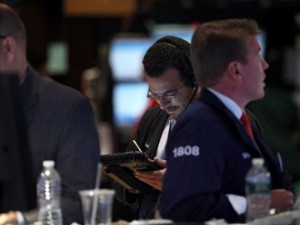US stocks sink as EU crunch week begins

Traders work on the floor of the New York Stock Exchange on June 25, 2012 in New York City. According to early tallies, the Dow Jones industrial average fell 138 points, or 1.1%. Spencer Platt/Getty Images/AFP
NEW YORK — US stocks tumbled Monday as Europe’s leaders appeared still-divided on how they will address their crisis in the coming crunch summit for the eurozone.
Research in Motion’s 7.6 percent drop on a downgrade from Morgan Stanley led a broad fall in tech stocks; Hewlett-Packard fell 4.1 percent, Microsoft 3.0 percent, Lenovo 6.0 percent and Dell 2.1 percent.
At the close the Dow Jones Industrial Average was down 138.12 points (1.09 percent) to 12,502.66 at the close of trade.
The S&P 500 slid 21.30 (1.60 percent) to 1,313.72, while the tech-rich Nasdaq lost 56.26 (1.95 percent) to 2,836.16.
The lack of agreement ahead of the summit at the end of the week on key steps needed to stem the eurozone crisis kept a cloud over markets, sending Europe’s bourses lower as well.
News reports of the continued policy disputes from Europe “underscore the reality that almost nothing has changed — at least not in a good way anyway as it pertains to the eurozone’s debt crisis,” said Patrick O’Hare of Briefing.com.
Nerves were not helped by news that the Greek finance minister has been forced to step down amid a health scare and that Cyprus asked for a eurozone bailout.
Meanwhile the markets were unimpressed with the US Census Bureau’s data release showing new houses in the US sold at their best pace — an annualized clip of 369,000 units — in two years in May.
On the Dow, Wal-Mart was the only gainer, adding 1.3 percent.
Shares of drugmakers Bristol-Myers Squibb and Pfizer sank after US drug regulators held off approving their new blood thinner Eliquis, asking for more information about the medicine.
Bristol-Myers lost 3.5 percent while Pfizer ended down 1.1 percent.
Major banks also took hits. Bank of America slid 4.3 percent, Morgan Stanley 4.7 percent, and Citigroup 4.4 percent.
US bond prices rose as the euro slipped against the dollar. The yield on 10-year treasuries fell to 1.61 percent from 1.67 Friday, while the 30 year yield dropped to 2.68 percent from 2.76 percent.
Bond yields go down as prices go up.